Bruno Arpaia | |
|---|---|
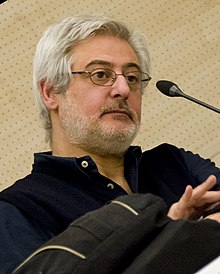 Bruno Arpaia | |
| Born | 1957 |
| Nationality | Italian |
| Alma mater | University of Naples |
| Occupation(s) | Writer, Journalist |
Bruno Arpaia, born in Naples (Italy) in 1957, is an Italian writer and journalist. [1]
Bruno Arpaia | |
|---|---|
 Bruno Arpaia | |
| Born | 1957 |
| Nationality | Italian |
| Alma mater | University of Naples |
| Occupation(s) | Writer, Journalist |
Bruno Arpaia, born in Naples (Italy) in 1957, is an Italian writer and journalist. [1]
After his degree in political sciences and a specialisation in American history at the University of Naples, he taught there and then became a journalist with the Italian newspaper Il Mattino of Naples, subsequently moving to Milan in 1989, where he worked for the daily La Repubblica.
In 1990 he published his first novel, I forestieri (The Foreigners), which won the Bagutta Prize the following year. Arpaia published another three novels, after leaving the newspaper La Repubblica in 1998, in order to dedicate himself solely to writing and freelance journalism.
L'Angelo della storia (Guanda, 2001) is his most successful novel, also being selected for the prestigious Campiello Prize in 2001. Translated into English in 2006 with the title The Angel of History by Minna Proctor, under the patronage of the Scottish Arts Council and the Italian Cultural Institute, it tells the partly fictional story of philosopher Walter Benjamin and a young Spanish militant in 1940. Arpaia's twofold narrative retraces Benjamin's flight across Europe and the Spaniard's youthful activism, as both men battle to assert their beliefs in the face of ultimate extinction.
Arpaia lives in Milan and currently alternates between translation, journalism and writing novels. He is also a publishing consultant for several Italian newspapers and publishing houses.

la Repubblica is an Italian daily general-interest newspaper with an average circulation of 151,309 copies in May 2023. It was founded in 1976 in Rome by Gruppo Editoriale L'Espresso and led by Eugenio Scalfari, Carlo Caracciolo, and Arnoldo Mondadori Editore as a leftist newspaper, which proclaimed itself a "newspaper-party". During the early years of la Repubblica, its political views and readership ranged from the reformist left to the extraparliamentary left. Into the 21st century, it is identified with centre-left politics, and was known for its anti-Berlusconism, and Silvio Berlusconi's personal scorn for the paper.

Luigi Ballerini is an Italian writer, poet, and translator.
il Giornale, known from its founding in 1974 until 1983 as il Giornale nuovo, is an Italian-language daily newspaper published in Milan with an average circulation of 28,933 copies in May 2023. In 2006, it was considered one of Italy's main national newspapers in Italy.
Daniela Hamaui is an Italian journalist and was the editor of the Rome-based magazine L'Espresso from 2002 to 2010.
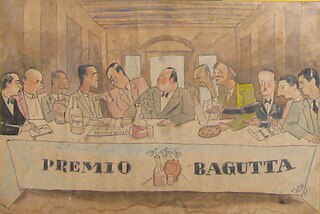
The Bagutta Prize is an Italian literary prize that is awarded annually to Italian writers. The prize originated among patrons of Milan's Bagutta Ristorante. The writer Riccardo Bacchelli discovered the restaurant and soon he regularly gathered numerous friends who would dine there together and discuss books. They began charging fines to the person who arrived last to an appointed meal, or who failed to appear.

Gianfranco Miglio was an Italian jurist, political scientist, and politician. He was a founder of the Federalist Party. For thirty years, he presided over the political science faculty of Milan's Università Cattolica. Later on in his life, he was elected as an independent member of the Parliament to the Italian Senate for Lega Nord. The supporters of Umberto Bossi's party called him Prufesùr, a Lombard nickname to remember his role.

Roberto Saviano is an Italian writer, essayist, journalist, and screenwriter. In his writings, including articles and his book Gomorrah, he uses literature and investigative reporting to tell of the economic reality of the territory and business of organized crime in Italy, in particular the Camorra crime syndicate, and of organized crime more generally.

Giovanni Gaeta was the real name of the Italian poet, writer and musician better known as E. A. Mario. He took the E of his assumed name from the initial letter of the pseudonym Ermes under which he wrote for the newspaper Il Ventesimo; the A came from Alessandro, the paper's chief editor; and Mario was the name of its Polish director.
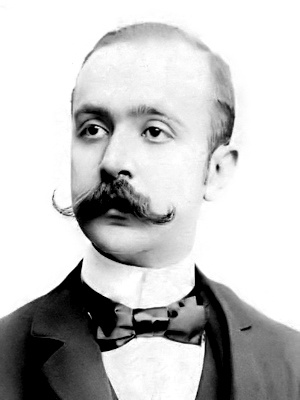
Federico De Roberto was an Italian writer, who became well known for his historical novel I Viceré (1894), translated as The Viceroys.

Giovanni Raboni was an Italian poet, translator and literary critic.

Bruno Paolo Vespa is an Italian television and newspaper journalist. A former director of the Italian state-owned TV channel Rai 1's news programme TG1, Vespa is the founding host of the programme Porta a Porta, which has been broadcast without interruption on RAI channels since 1996.
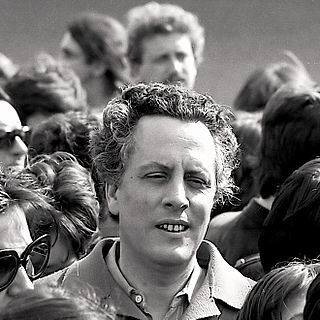
Antonio Porta was an author and poet and one of the founders of the Italian literary movement Gruppo 63.
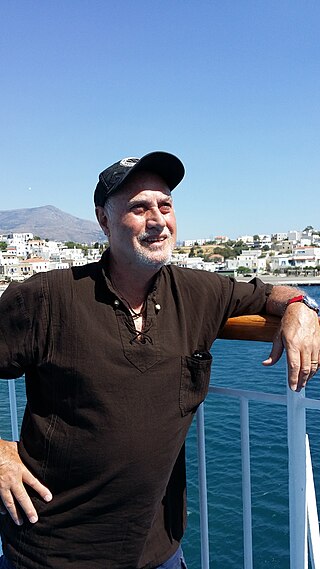
Luigi Augusto Fontanella is a poet, critic, translator, playwright, and novelist.
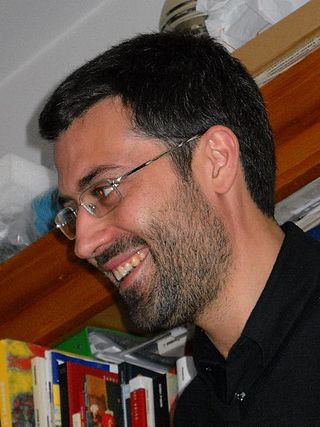
Andrea Bajani is an Italian novelist, poet, and journalist. After his debut with Cordiali saluti, it was Se consideri le colpe which brought him a great deal of attention. Antonio Tabucchi wrote about his debut novel, "I read this book with an excitement that Italian literature hasn't made me feel in ages." The book won the Super Mondello Prize, the Brancati Prize, the Recanati Prize and the Lo Straniero Prize.
Beppe Sebaste is an Italian writer, poet, translator, and journalist.
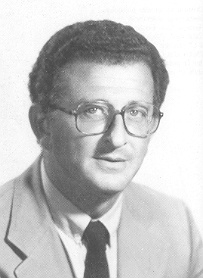
Andrea Barbato was an Italian journalist, politician, author, broadcaster, and screenwriter.

Beatrice Monroy is an Italian writer and dramatist.

Sergio Wolmar Zavoli was an Italian sports and documentary journalist and politician.
Adele Cambria was an Italian journalist, writer and actress.

Antonio Scurati is an Italian writer and academic. In 2019, he was awarded the prestigious Strega Prize for his novel M: Son of the Century (2018).